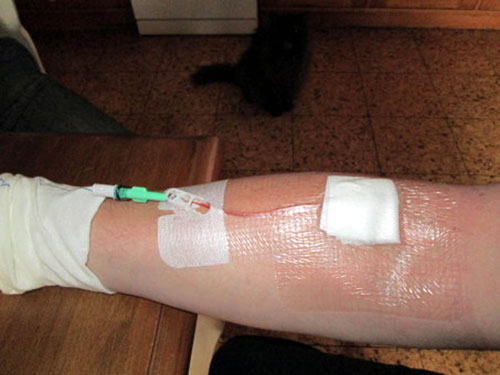A SCOT who says he’s dying of a disease caused by a tick bite claims the NHS abandoned his treatment – and told him to see a psychologist.
Graham Harris Graham claims it took more than a year to get his illness correctly identified but is still not getting the help he needs.
Once an active photographer who enjoyed mountaineering and cycling the 50-year-old now fears he only has a couple of years to live unless something is done.

Mr Graham from Stanley, Perthshire, believes a deer tick that bit him on the toe in 2013 gave him Lyme disease.
He began suffering from severe joint pain, acute sensitivity to light, heat and sound as well as crushing exhaustion. Now he uses a wheelchair to get around.
At first doctors thought he was suffering from “chronic fatigue syndrome” but after pushing for a second opinion Mr Graham says he was finally diagnosed with the deadly bacterial infection.
He says he started treatment at Ninewells Hospital, Dundee, but was told it was stopping and he should speak to a psychologist.
“It struck me as a staggeringly idiotic decision to take,” said Mr Graham.
“To get this treatment cancelled when it was really starting to make a difference was disgraceful. I cannot understand it.

“I could feel I was getting my life back. By the end of it, I was even driving to get my treatment.”
He continued: “I don’t want to sound overly dramatic, but I know deep down that if I don’t get this treatment I will be dead in a couple of years.
“I used to cycle miles and miles every day, now I feel that I can barely leave the house.”
His wife Lora says he has been left “profoundly disabled” by his illness.
Mrs Graham said: “As a consequence of NHS Scotland taking over a year to correctly diagnose his symptoms, Graham remains disabled; unable to walk more than a few yards, unable to drive & unable to care for himself.
“His cognitive skills are significantly reduced and he suffers from short term memory loss as well as brain fog, violent tremors, blackouts and frequent fever-like symptoms.
“Yet, despite his grave condition, his positive laboratory test and obvious clinical signs, the infectious diseases department at Ninewells Hospital in Dundee wrote to him in June this year, claiming that nothing more could be done beyond the three week drug therapy he received in April this year.

“And incredibly, with no more treatment on offer, the only other advice presented to Graham by the NHS, was to seek a psychologist to help him manage his symptoms.”
Mrs Graham, who is fundraising for her husband be treated in the States, added: “I just want him to have some quality of life back.
“At the very least, I would hope that he can get back to work.”
NHS Tayside insist they follow standard procedures for the treatment of Lyme disease and claim further courses of antibiotics are “unlikely” to help symptoms.
An NHS Tayside spokeswoman said: “Due to patient confidentiality, we cannot comment on individual cases.”
She continued: “NHS Tayside follows the position statement by the British Infection Association for the diagnosis and treatment of Lyme Disease.
“After an appropriate antibiotic treatment further courses of antibiotics are unlikely to further improve ongoing symptoms and other support services may be offered.”
The spokeswoman added: “Lyme Disease can be difficult to diagnose as blood tests can be negative in the first few weeks after exposure to an infected tick.
“All specimens found to be positive in our laboratory are sent to the Scottish Reference Centre for Lyme Disease for confirmation.”
There is growing concern about the danger of ticks as the number of people diagnosed with Lyme Disease is on the rise.
According to the NHS around 3,000 people every year are diagnosed, however, due to underreporting and people being unaware of the symptoms the true figure may be as high as 15,000.
Roger Evans, of the Scottish Lyme disease testing laboratory, wrote in the British Medical Journal in 2014 that the number of positive tests is increasing year on year.
The disease is not always dangerous if it is caught early. Symptoms, which often include flu like fatigue and muscle pain, generally appear between two and 30 days after being bitten.

